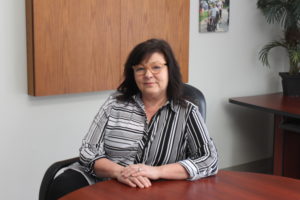Funding and research solves problems of brain injuries

Lynn Calder, executive director at Assisted Living Southwestern Ontario. Photo by Tyler Clapp.
A little funding and research can go a long way to preventing brain injuries and helping those living with them.
Anna Jurak, executive director of the Brain Injury Association of Windsor-Essex County, said certain aspects of brain injuries can pose a challenge to overcome.
“There are as many symptoms as there are brain injuries,” she said. “One of the big difficulties is often times you can’t see a brain injury especially with a concussion.”
According to Brain Injury Canada — an organization that promotes brain injury care and awareness — roughly 1.5 million Canadians are affected by brain injuries each year. An additional 160,000 people receive a brain injury annually.
Jurek said methods like a blood test designed to find mild traumatic brain injuries is one example of research making these ailments easier to handle.
Brain injury survivors often suffer from permanent long-term symptoms, including chronic pain, difficulty making plans, as well as mental health issues like depression and anxiety. They can also have difficulties with day-to-day tasks like eating or bathing which require different living spaces.
Other resources like supportive housing can also serve as a way to receive aid.
“We have one supportive housing site here in Windsor-Essex where many communities do not have any. It started out with five bedrooms and now has seven,” said Lynn Calder, executive director of Assisted Living Southwestern Ontario.
Still, Jurak said steady funding is necessary to ensure those who suffer from brain injuries can continue to be helped.
“I guess the ideal thing is to have some systems in place that would guarantee a steady source of income so that year to year, you can plan better and know what you’re able to do,” she said.
Calder said she also plans to continue “Neighborhoods of Care”, an initiative that began in 2011 which brings personal support needs like counselling, gardening and cooking to people living with disabilities right to their own homes.
“Neighborhoods of Care essentially have a service hub in the middle and within a 10 to 15 minute radius of that service hub, and we have 15 of them now across Windsor-Essex County,” said Calder.
For her part, Jurak said she hopes to help those living with brain injuries become more independent.
“We’d like to start a program to teach people with brain [injuries] on ways they can get back to work and get accommodations at work that are required for them to stay in a job,” she said.


